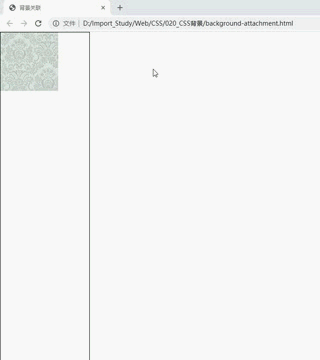1. CSS允许应用纯色作为背景, 也允许使用背景图像创建相当复杂的效果。
2. CSS背景属性

3. 所有背景属性都不能继承。
4. 背景色
4.1. background-color属性设置元素的背景颜色。这个属性接受任何合法的颜色值。
4.2. background-color属性为元素设置一种纯色。这种颜色会填充元素的内容、内边距和边框区域。如果边框有透明部分(如虚线边框), 会透过这些透明部分显示出背景色。
4.3. 可以为所有元素设置背景色, 这包括body一直到em和a等行内元素。
4.4. 默认值

4.5. 可能的值

4.6. 例子
4.6.1. 代码
<!DOCTYPE html>
<html>
<head>
<title>背景色</title>
<meta charset="utf-8" />
<style type="text/css">
body {
background-color: yellow;
}
h1,h2,p {
width: 200px;
height: 200px;
border: dashed 10px;
margin: 10px;
padding: 20px;
float: left;
}
h1 {
background-color: #00ff00;
}
h2 {
background-color: transparent;
}
p {
background-color: rgb(250,0,255);
}
</style>
</head>
<body>
<h1>这是标题 1</h1>
<h2>这是标题 2</h2>
<p>这是段落</p>
</body>
</html>
4.6.2. 效果图

5. 背景图像
5.1. background-image属性为元素设置背景图像。
5.2. 如果需要设置一个背景图像, 必须为这个属性设置一个url值:
body {
background-image: url('eg_bg_04.gif');
}
5.3. 元素的背景占据了元素的全部尺寸, 包括内边距和边框, 但不包括外边距。
5.4. 默认地, 背景图像位于元素的左上角, 并在水平和垂直方向上重复。
5.5. 默认值

5.6. 可能的值

6. 背景重复
6.1. background-repeat属性设置是否及如何重复背景图像。
6.2. 默认值

6.3. 可能的值

6.4. 例子
6.4.1. 代码
<!DOCTYPE html>
<html>
<head>
<title>背景重复</title>
<meta charset="utf-8" />
<style type="text/css">
body {
background-image: url('eg_bg_03.gif');
background-repeat: repeat-y;
}
</style>
</head>
<body>
</body>
</html>
6.4.2. 效果图

7. 背景定位
7.1. background-position属性设置背景图像的起始位置。
7.2. 默认值

7.3. 可能的值

8. 背景定位-关键字
8.1. 图像放置关键字最容易理解, 其作用如其名称所表明的。例如: top right使图像放置在元素内边距区的右上角。
8.2. 根据规范, 位置关键字可以按任何顺序出现, 只要保证不超过两个关键字, 一个对应水平方向, 另一个对应垂直方向。
8.3. 如果只出现一个关键字, 则认为另一个关键字是center。两个关键字没有顺序。
8.4. 水平方向关键字: left、right和center。
8.5. 竖直方向关键字: top、bottom和center。
8.6. 例子
8.6.1. 代码
<!DOCTYPE html>
<html>
<head>
<title>背景定位-关键字</title>
<meta charset="utf-8" />
<style type="text/css">
div {
width: 150px;
height: 150px;
border: solid 1px;
margin: 10px;
background-image: url('eg_bg_03.gif');
background-repeat: no-repeat;
float: left;
}
#div1 {
background-position: center;
background-color: red;
}
#div2 {
background-position: center center;
background-color: red;
}
#div3 {
background-position: center left;
background-color: yellow;
}
#div4 {
background-position: center right;
background-color: orange;
}
#div5 {
background-position: center top;
background-color: gray;
}
#div6 {
background-position: center bottom;
background-color: blue;
}
#div7 {
background-position: left;
clear: left;
background-color: yellow;
}
#div8 {
background-position: left top;
background-color: green;
}
#div9 {
background-position: left bottom;
background-color: pink;
}
#div10 {
background-position: left center;
background-color: yellow;
}
#div11 {
background-position: right;
clear: left;
background-color: orange;
}
#div12 {
background-position: right top;
background-color: lightblue;
}
#div13 {
background-position: right bottom;
}
#div14 {
background-position: right center;
background-color: orange;
}
#div15 {
background-position: top;
clear: left;
background-color: gray;
}
#div16 {
background-position: top left;
background-color: green;
}
#div17 {
background-position: top right;
background-color: lightblue;
}
#div18 {
background-position: top center;
background-color: gray;
}
#div19 {
background-position: bottom;
clear: left;
background-color: blue;
}
#div20 {
background-position: bottom left;
background-color: pink;
}
#div21 {
background-position: bottom right;
}
#div22 {
background-position: bottom center;
background-color: blue;
}
</style>
</head>
<body>
<div id="div1">center</div>
<div id="div2">center center</div>
<div id="div3">center left</div>
<div id="div4">center right</div>
<div id="div5">center top</div>
<div id="div6">center bottom</div>
<div id="div7">left</div>
<div id="div8">left top</div>
<div id="div9">left bottom</div>
<div id="div10">left center</div>
<div id="div11">right</div>
<div id="div12">right top</div>
<div id="div13">right bottom</div>
<div id="div14">right center</div>
<div id="div15">top</div>
<div id="div16">top left</div>
<div id="div17">top right</div>
<div id="div18">top center</div>
<div id="div19">bottom</div>
<div id="div20">bottom left</div>
<div id="div21">bottom right</div>
<div id="div22">bottom center</div>
</body>
</html>
8.6.2. 效果图

9. 背景定位-百分数值
9.1. 百分数值同时应用于元素和图像。也就是说, 图像中描述为50% 50%的点(中心点)与元素中描述为50% 50%的点(中心点)对齐。
9.2. 如果只提供一个百分数值, 所提供的这个值将用作水平值, 垂直值将假设为50%。这一点与关键字类似。
9.3. 例子
9.3.1. 代码
<!DOCTYPE html>
<html>
<head>
<title>背景定位-百分数值</title>
<meta charset="utf-8" />
<style type="text/css">
div {
width: 150px;
height: 150px;
border: dashed 10px;
margin: 10px;
padding: 10px;
background-image: url('eg_bg_03.gif');
background-repeat: no-repeat;
float: left;
}
#div1 {
background-position: 0% 0%;
}
#div2 {
background-position: 0% 50%;
}
#div3 {
background-position: 0% 100%;
}
#div4 {
background-position: 50% 0%;
}
#div5 {
background-position: 50% 50%;
}
#div6 {
background-position: 50% 100%;
}
#div7 {
background-position: 100% 0%;
}
#div8 {
background-position: 100% 50%;
}
#div9 {
background-position: 100% 100%;
}
#div10 {
width: 1300px;
background-position: 10% 0%;
}
</style>
</head>
<body>
<div id="div1">0% 0%</div>
<div id="div2">0% 50%</div>
<div id="div3">0% 100%</div>
<div id="div4">50% 0%</div>
<div id="div5">50% 50%</div>
<div id="div6">50% 100%</div>
<div id="div7">100% 0%</div>
<div id="div8">100% 50%</div>
<div id="div9">100% 100%</div>
<div id="div10">10% 0%</div>
</body>
</html>
9.3.2. 效果图

10. 背景定位-长度值
10.1. 长度值是图像的左上角相对于元素内边距区左上角的偏移。
10.2. 比如: 如果设置值为50px 100px, 图像的左上角将在元素内边距区左上角向右50像素、向下100像素的位置上:
body {
background-image: url('/i/eg_bg_03.gif');
background-repeat: no-repeat;
background-position: 50px 100px;
}
10.3. 例子
10.3.1. 代码
<!DOCTYPE html>
<html>
<head>
<title>背景定位-长度值</title>
<meta charset="utf-8" />
<style type="text/css">
div {
width: 150px;
height: 150px;
border: solid 1px;
margin: 10px;
background-image: url('eg_bg_03.gif');
background-repeat: no-repeat;
float: left;
}
#div1 {
background-position: 0px 0px;
}
#div2 {
background-position: 10px 0px;
}
#div3 {
background-position: 20px 0px;
}
#div4 {
background-position: 0px 10px;
}
#div5 {
background-position: 0px 20px;
}
#div6 {
background-position: 10px 10px;
}
#div7 {
background-position: 10px 20px;
}
#div8 {
background-position: 20px 10px;
}
#div9 {
background-position: 20px 20px;
}
</style>
</head>
<body>
<div id="div1">0px 0px</div>
<div id="div2">10px 0px</div>
<div id="div3">20px 0px</div>
<div id="div4">0px 10px</div>
<div id="div5">0px 20px</div>
<div id="div6">10px 10px</div>
<div id="div7">10px 20px</div>
<div id="div8">20px 10px</div>
<div id="div9">20px 20px</div>
</body>
</html>
10.3.2. 效果图

11. 背景关联
11.1. background-attachment属性设置背景图像是否固定或者随着页面的其余部分滚动。
11.2. 默认值

11.3. 可能的值

11.4. 例子
11.4.1. 代码
<!DOCTYPE html>
<html>
<head>
<title>背景关联</title>
<meta charset="utf-8" />
<style type="text/css">
body {
margin: 0;
padding: 0;
}
div {
width: 200px;
height: 1300px;
border: solid 1px;
background-repeat: no-repeat;
background-attachment: scroll;
background-image: url('eg_bg_03.gif');
}
</style>
</head>
<body>
<div></div>
</body>
</html>
11.4.2. 效果图

12. 背景
12.1. background 简写属性在一个声明中设置所有的背景属性。
12.2. 在使用简写属性时, 属性值的顺序为: background-color、background-image、background-repeat、background-attachment、background-position、background-size、background-origin和background-clip。
12.3. 属性值之一缺失并不要紧, 只要按照此顺序设置其他值即可。比如: "background: #ff0000 url('smiley.gif');" 也是允许的。
12.4. 通常建议使用这个属性,而不是分别使用单个属性,因为这个属性在较老的浏览器中能够得到更好的支持,而且需要键入的字母也更少。
12.5. 默认值

12.6. 可能的值

12.7. 例子
12.7.1. 代码
<!DOCTYPE html>
<html>
<head>
<meta charset="utf-8" />
<title>背景</title>
<style type="text/css">
div {
width: 500px;
height: 1500px;
border: solid 1px;
background: #FF0000 url('eg_bg_03.gif') no-repeat scroll top center / 260px 260px padding-box border-box;
}
</style>
</head>
<body>
<div></div>
</body>
</html>
12.7.2. 效果图






 本文详细介绍了CSS中的背景属性,包括background-color用于设置元素背景色,background-image设置背景图像,background-repeat控制图像重复方式,background-position设定图像初始位置,以及background-attachment决定背景图像是否随页面滚动。示例代码和效果展示了各种属性的使用方法,帮助读者深入理解CSS背景样式设置。
本文详细介绍了CSS中的背景属性,包括background-color用于设置元素背景色,background-image设置背景图像,background-repeat控制图像重复方式,background-position设定图像初始位置,以及background-attachment决定背景图像是否随页面滚动。示例代码和效果展示了各种属性的使用方法,帮助读者深入理解CSS背景样式设置。
















 507
507

 被折叠的 条评论
为什么被折叠?
被折叠的 条评论
为什么被折叠?








